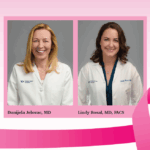
Tips for lowering your risk of Colon Cancer
When it comes to protecting your health, routine cancer screenings and positive lifestyle choices are key factors in prevention. Over the last few decades, screening tests for colorectal cancer, such as colonoscopies and stool-based tests, have improved both detection and outcomes for patients. However, doctors and researchers are sounding the alarm at the steady rise in colorectal cancer rates in adults under 50. According to the American Cancer Society’s colorectal cancer statistics, 2020, incidence rates have stabilized in individuals 50 to 64 years old, while rates of colorectal cancer are increasing in people younger than 50.
To help reduce the risk of colorectal cancer, individuals should focus on prevention with routine cancer screenings and implementing a healthier lifestyle.
With that in mind, here are five tips on how you can better protect your colorectal health:
Tip 1: Routine Cancer Screening
Cancer screening can help detect cancer at an early stage, when it’s easier to treat. Routine colorectal screening is an effective way to find precancerous polyps and early-stage cancer.
The American Cancer Society recommends colorectal cancer screening beginning at age 45 for those at average risk. Most insurance companies now cover screening colonoscopies starting at age 45. But people with increased or high risk of colorectal cancer might need to start screening before the age of 45, be screened more often, and/or get specific tests. This includes people with:
- A strong family or personal history of colorectal cancer or certain types of polyps.
- A personal history of inflammatory bowel disease, such as ulcerative colitis or Crohn’s disease.
- A family history of a hereditary colorectal cancer syndrome, such as familial adenomatous polyposis (FAP) or Lynch syndrome.
- A personal history of radiation to the abdomen or pelvic area to treat prior cancer.
Individuals with a family history of colon cancer should consider screening at age 40, or 10 years earlier than the youngest family member diagnosed. In families with Lynch syndrome or other hereditary colorectal cancer syndromes, colonoscopy screening should begin as early as age 20, or two to five years earlier than the youngest family member diagnosed.
Talk with your doctor about which screening options are best for you.
Tip 2: Stop Smoking and Eliminate All Tobacco
Tobacco products, including e-cigarettes and vape pens, can increase risks for cancer, heart disease, diabetes, stroke, lung disease, and other serious diseases with long-term health consequences. The harmful toxins in tobacco smoke have the ability to alter your DNA and cause abnormal cell development, which can lead to cancer.
If you need to quit tobacco, talk with your doctor. In addition, there are support services available to help. The CDC offers “quitlines” that provide coaching at 1-800-QUIT-NOW. The American Cancer Society also provides tools online and over the phone at 1-800-227-2345.
Tip 3: Focus on Exercise and a Healthy Diet
Making time for physical activity and healthy food can help reduce your risk of disease, including diabetes and obesity. These diseases are risk factors for developing colorectal cancer. In fact, the National Institutes of Health (NIH) cites that more than 40% of patients diagnosed with colorectal cancers also have other diseases.
While exercise is an effective tool for weight and stress management, it can also:
- Lower your risk of developing precancerous polyps and colorectal cancer
- Increase antioxidant levels
- Reduce insulin resistance and inflammation
- Improve immunity
When making healthy food choices, it’s best to avoid processed or fried foods, as well as limit red meats. These foods can be high in added sugar, oils, and fats, which can contribute to insulin resistance and inflammation. They are also linked to an increased risk of colorectal cancer.
Instead, prepare meals that include vegetables, fruits, lean meats, and whole grains. High-fiber and nutrient-dense foods can help prevent colon cancer. Also, hydrate with water and limit your intake of sugary or caffeinated drinks.
Tip 4: Cut Back on Alcohol
Alcohol use is linked to a higher risk of colorectal cancer. Studies suggest that the ethanol found in alcoholic drinks has the potential to reduce the body’s ability to absorb essential nutrients, increasing the risk of colorectal cancer.
People who choose to drink alcohol should limit their consumption to two drinks per day for men and one drink per day for women. If you also use tobacco, it’s important to note that the combination of alcohol and smoking is more likely to cause cancer than either habit alone.
Tip 5: Take Charge of Your Health
Be your own health advocate. If you are concerned or notice symptoms of colorectal cancer, talk with your doctor and request appropriate screening.
Symptoms to discuss with your doctor:
- Changes in bowel habits that last longer than 1-2 weeks, including diarrhea, constipation, or pencil-thin stools.
- Rectal bleeding or stool that is bright red, dark, or tar-like.
- Abdominal cramping or bloating that does not go away.
- Unexplained weight loss.
- Chronic Fatigue.
According to Samuel Lee, MD at Virginia Cancer Specialists, you should talk with your doctor about any new or concerning symptoms you’re experiencing – no matter your age. “Even if you don’t think you fit the typical demographic for colorectal cancer,” Dr. Lee said, “speaking with your provider about any new or unusual symptoms is key to effectively managing your health.”
Overall, it’s important to understand that you can help improve your colorectal health by ensuring routine cancer screenings, making positive lifestyle choices, and advocating for yourself.
For more information on colorectal cancer signs, symptoms, and risk factors, please visit the Virginia Cancer Specialists colon cancer information page.
Virginia Cancer Specialists (VCS) is the largest comprehensive private cancer practice in Northern Virginia, featuring a world-class treatment team committed to fighting cancer and diseases of the blood. VCS provides patients access to leading-edge treatment protocols, clinical trials, and comprehensive care, along with a multidisciplinary approach to medical oncology, radiation oncology, musculoskeletal tumor surgery, breast surgery, and thoracic surgery. They also offer genetic counseling, palliative care, oncology nurse navigators, physician assistants, nurse practitioners, oncology infusion nurses, oncology pharmacists, social workers, dietitians, and laboratory technicians.

Download the guide here

















